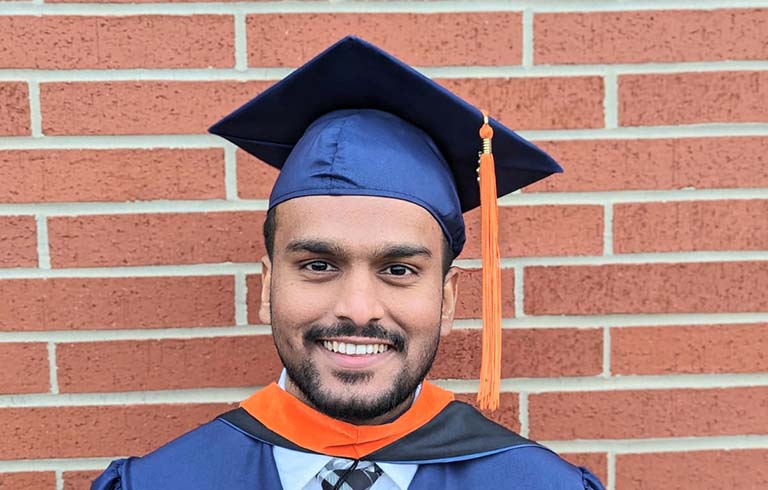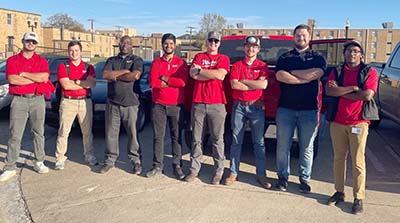
The skills and knowledge to succeed
Abdul Musaddiq Syed’s Trine University degree and the skills it provided propelled him to an extremely successful career.
February 19, 2024
By Ian Hoffman
Communication ’26

Logan's experiences in his coursework and his manufacturing co-op allowed him to help pave the way for Trine’s Extended Reality (XR) degree, which began accepting students during the fall semester of 2022. In this program, students can learn about implementing virtual or augmented reality in fields like gaming, product testing, and modeling. These products can then be used in a wide variety of fields – from sports to medicine to manufacturing.
Realizing the application and uses for XR is something Krehbiel has been involved with at Trine from day one. His interest was sparked by helping Kinsey Cotton Kelly, PhD, a biomedical engineering professor at Trine.
“I was enjoying helping my professor and academic advisor Dr. Kelly in adding virtual reality to her course work and helping her out with side projects, which is what finally helped me reach the decision to switch my major while continuing to pursue biomedical engineering as a minor,” said Krehbiel of his change in degree plan.
Krehbiel also had the opportunity to work as the OPeX (operations excellence) intern for Milwaukee Tool. His main responsibilities were designing methods to improve employee productivity and accessibility. One of his tasks was designing artificial intelligence software (AI) to help employees find and easily access various reports.
His biggest project used interactive augmented reality (AR), which is designed to put the user in a “real-world” scenario by using a virtual reality (VR) headset. He designed a program that helped train Milwaukee employees on safely assembling, disassembling and performing maintenance on specific Milwaukee tools.
Krehbiel was very proud of his work, saying, “I worked on this project over the course of my entire co-op tenure, and it turned out very well in my opinion.”
In a conversation after Krehbiel’s internship, his supervisor noted, “The overseas branch in Australia was very impressed [with the AR program] and that their branch would continue based off of [Krehbiel’s] designs to create more tool training courses for other more complex tools to further reduce the time required for employee tool training.”
Krehbiel has made just as much of an impact at Trine as he did at Milwaukee. When he first arrived at Trine, XR technology was only used in the course “Biology for Engineers.” With the development of the Extended Reality program and his help, other programs like Biomedical Engineering, Chemical Engineering, Civil Engineering, Exercise Science, Mathematics, Mechanical Engineering, and Design Engineering Technology now have virtual and extended reality worked into their respective curriculums.
Trine undoubtedly had an impact on Krehbiel. He leaned on his education and experiences from Trine a lot when working with Milwaukee, saying, “What helped me the most was the teamwork skills taught to me by Dr. Kelly, as working together on a school project is no different than a work project, and the ability to work with everyone to better the company is all that matters at the end of the day.”
This rapid growth of the XR program is one of the reasons Krehbiel would recommend Trine to future students interested in pursuing a career in the extended reality field. “I would tell someone to consider Trine because our program has grown so much in just my time here, and it continues to expand into other areas of teaching with every semester,” he said. “If you want to be on the forefront of extended reality practices, and then help your university to apply these practices to other majors and activities, come to Trine and help make a difference.”
As for his future, Logan will graduate in May. He hopes to marry his longtime girlfriend and pursue a career in the medical industry. He wants to utilize AR to assist doctors with medical imaging technologies such as feeding a live CT scan to the doctor while they guide a needle in for a biopsy sample. He plans on moving to Ohio to work for MediView, part of the Clevland Clinic family of medical institutions.